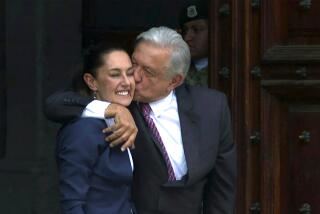Haunted by Colosio : Candidate’s Slaying Shadows Mexico’s Zedillo on Tijuana Visit
- Share via
TIJUANA — Ernesto Zedillo, the ruling party candidate in the closely fought and volatile race for the Mexican presidency, Thursday brought his campaign to potentially hostile territory: Baja California.
The border state is a bastion of the opposition National Action Party (PAN), whose hard-charging standard-bearer, Diego Fernandez, has emerged in many polls as the main challenger to Zedillo’s Institutional Revolutionary Party, widely known as the PRI, which has ruled Mexico for 65 years.
And here more than anywhere in Mexico, the ghost of slain PRI candidate Luis Donaldo Colosio haunts the Zedillo campaign. The assassination of Colosio at a March 23 rally in Tijuana catapulted Zedillo, a reserved, 43-year-old economist, into the role of replacement candidate for an increasingly fractious party that confronts an unprecedented threat.
In a speech at a sweltering union hall in the port city of Ensenada, the bespectacled Zedillo made it clear that the border state represents a key battlefield in the Aug. 21 national election.
“I am committed to leading our party to a triumph here in Baja California,” Zedillo said, his open-necked shirt drenched with sweat, reminding the crowd that he grew up in Mexicali and saying he hopes to retire to the coast of Ensenada one day.
This regional appeal could help Zedillo make incursions into the PAN’s power base in an unusually close national race with Fernandez and fellow challenger Cuauhtemoc Cardenas of the Democratic Revolutionary Party (PRD). Although the PRI has been battered by crises--the Colosio assassination, an armed uprising in Chiapas, drug violence, corruption--its political machine remains formidable, according to Tonatiuh Guillen Lopez, a political scientist at the College of the Northern Border in Tijuana.
“In a race where the margin of victory will be small, Zedillo’s regional appeal could be significant,” Guillen said. “Ironically, the PRI benefits from the fact that both opposition parties are strong. They could neutralize one another.”
Politics notwithstanding, small but unmistakable reminders of the Colosio case marked Zedillo’s path in Baja. Zedillo made a quick pilgrimage Wednesday night to the site of the assassination in the canyon shantytown of Lomas Taurinas, where he repeated his calls for justice. Ensenada supporters chanted Colosio’s name Thursday, describing Zedillo as the man who had picked up the torch of his fallen predecessor. The candidate’s security guards were numerous and vigilant.
However, less than four months after a slaying that many Mexicans attribute to a plot within the ruling party, the profile of the Colosio case seems to be fading. Despite its profound impact on Tijuana, the assassination was not mentioned during a live television interview Wednesday night in which Zedillo talked at length about improving tourism and ensuring that Mexican milk can compete in the era of free trade.
And a crowd of well-wishers pushed very close to Zedillo after the Ensenada speech, shaking his hand, giving him campaign posters to autograph and planting kisses on his cheek. The scene seemed uncomfortably reminiscent of the moments before Colosio was shot, but PRI stalwarts said afterward that the candidate faced no danger in Ensenada.
“The fight must go on!” one woman shouted. “He will win. God protect him.”
Official efforts to shift public attention from Colosio appear to be working, according to political scientist Guillen.
The public focus on Zedillo’s bid derives from a traditional of heavily concentrated power in the Mexican presidency. “It is a product of Mexican presidential (politics): ‘The king is dead, long live the king,’ ” Guillen said, adding that he does not expect breakthroughs in the much-criticized investigation of the Colosio murder before the August election.
During other campaign stops, Zedillo sounded themes consistent with his attempt to reinvent his party as a modernizing, reformist force. He called for a redistribution of power from the federal government to state and city authorities--a dramatic change in the heavily centralized Mexican system and a frequent demand of the PAN.
Zedillo urged sweeping law enforcement reforms, calling lawlessness the nation’s gravest problem. And he mixed his feisty predictions of victory with a conciliatory tone, promising to work closely with opposition governments in Baja if he is elected.
More to Read
Sign up for Essential California
The most important California stories and recommendations in your inbox every morning.
You may occasionally receive promotional content from the Los Angeles Times.










